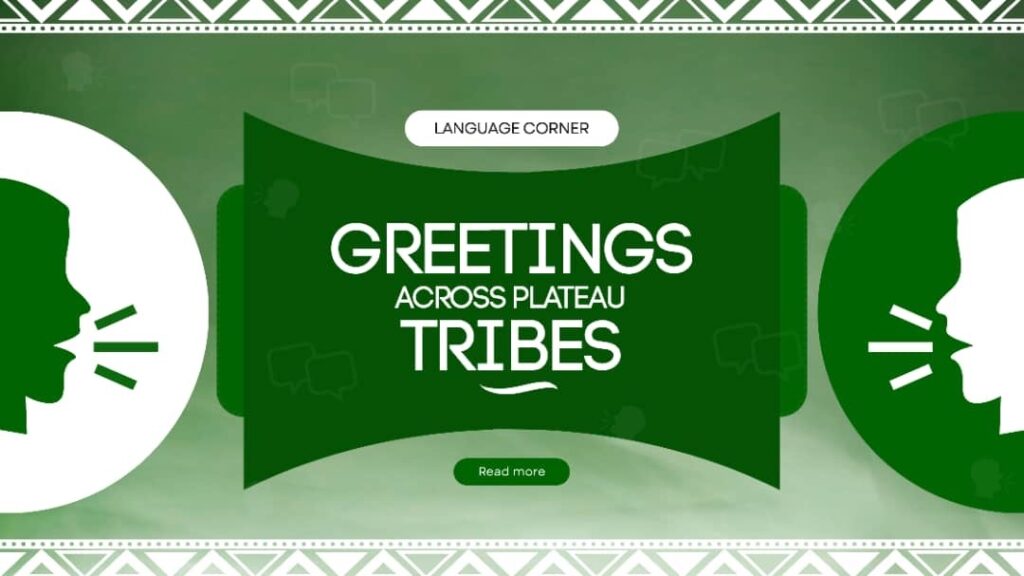If there is one thread that holds the many peoples of Plateau State together, it is the rich culture of greeting. On the Plateau, a greeting is never just a formality it is a sign of respect, an acknowledgement of presence, and an invitation into another’s world. To say “good morning” here is not only to mark the start of the day but to open the door to friendship, trust, and even favor.
To walk past an elder without greeting, or to pass by a group of farmers without a word, is enough to mark you as a stranger—someone who, perhaps, did not grow up in the Plateau’s way of life. Here, greetings are the oil that keeps daily interactions smooth, the gentle bridge that allows over fifty different ethnic groups to live together in remarkable harmony.
Let us take a journey into the languages of some Plateau tribes, to see how greetings reveal not just words, but the heart of a people.
Berom: The People of Jos Highlands
The Berom, the largest ethnic group on the Plateau, are known for their warm communal spirit. Among them, greetings are woven into the fabric of daily life. Two Berom youths will often clasp hands in a firm handshake, while a younger person bows slightly, lowering eyes and head, in deference to an elder.
Their words are as soft as the cool Jos breeze:
Shòù — a universal greeting that fits any time of day.
Pɔl tyang — “good morning,” often said with a smile.
Hwo pɔl tyang — an evening farewell, like the sun’s last light.
Ala fwom mo ɛ? — a greeting for someone at work, showing interest in their effort.
Ma feng — the grateful reply, meaning “thank you.”
For the Berom, every greeting carries respect, as though saying: “I see you, I honor you.”
Ngas: The Philosophers of the Plateau
In the southeast, the Ngas (or Angas) people greet with thoughtful curiosity. Their greetings are rarely brief; they can turn into conversations about one’s health, family, or even one’s journey.
Răng ĕ? — “how are you?”
Bwāp — “I am well.”
Ămwĕn kŭk ā? — “are you on your journey?”
Ăn mwĕn kŭk gnēt — “yes, I am on my way.”
To greet a Ngas elder in the morning, you might say: Ăyal ā? — “have you risen?” And the elder, with a satisfied nod, may reply: Ănyāl — “I have risen.”
There is poetry in these exchanges. The Ngas greeting does not just check on well-being; it affirms life itself.
Tarok: The Keepers of Tradition
In Langtang, the Tarok people are famous for carrying their greetings wherever they go. No matter the setting—market, farm, or distant city—they hold to their traditional forms of address.
Ikangkang sang ya — a morning greeting.
O fa okangkang — another way to say good morning.
The simple reply, Ikangkang, restores balance, like an echo across the hills.
For the Tarok, greeting is identity—it is how they remain Tarok, even away from home.
Mwaghavul: The Gentle Conversationalists
Closely related to the Ngas, the Mwaghavul people love long, considerate greetings. A single encounter may begin with three or four different questions about health and family.
Are’e — Hello
To’ohg — Hi
Teer rabgha — good morning
Raangha — morning
Wèt ka’aham ha — Good day
Mwanle’e — Welcome
Riyaŋ pe wi ɗi — a general greeting.
Gha araŋ ye? — “how are you?”
Plangdee’s — thank you
Every Mwaghavul greeting feels like a small conversation, reminding you that you are never alone.
Goemai: Respect in Every Gesture
Among the Goemai of central Plateau, greetings are as much about body language as words. A young person squats slightly before an elder, showing humility before speaking.
Tagoe pet ha — “good morning.”
Henshin goedong — “thank you.”
Ho — a simple hello.
Ho goede — “welcome.”
In Goemai culture, a greeting is never rushed. It is a gift, given with respect and received with warmth.
The Harmony of Greetings:
Whenever you step onto the Plateau, you’re stepping into a land of voices each tribe with its own unique rhythm of greeting, yet they all echo the same spirit: respect, warmth, and belonging. Whether it is the Berom man saying “Shòù” to a group of farmers, the Ngas elder affirming “Ănyāl” to the morning greetings of a youth, or the Goemai youth squatting before an elder, greetings are more than words here.
They are the reason a state of over fifty ethnic groups can remain one family. Greetings are the Plateau’s quiet anthem of peace, reminding us that no matter how diverse we are, the first step to harmony begins with a simple word: hello.

